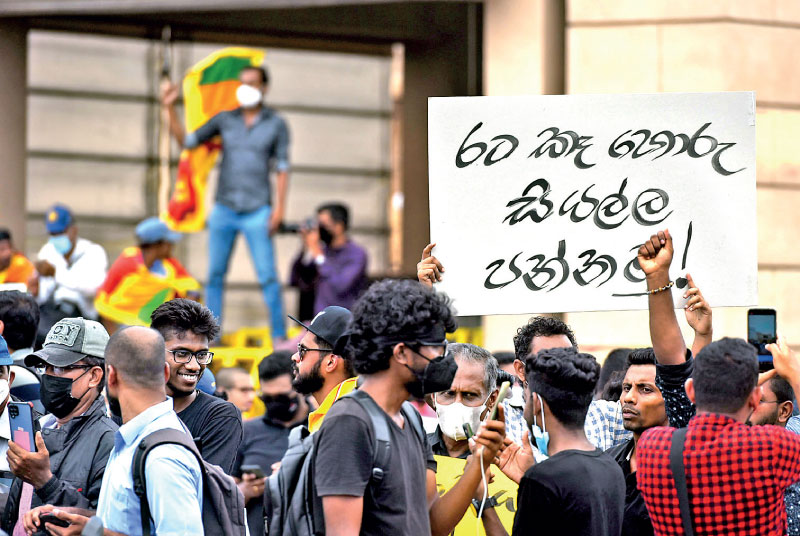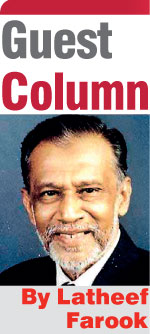Friday Feb 20, 2026
Friday Feb 20, 2026
Monday, 18 April 2022 00:17 - - {{hitsCtrl.values.hits}}

Politicians will no longer be able to sell racism and religion, hoodwink people and loot the country which is bound to march towards a better future
 Peaceful uprising sweeping Sri Lanka is a timely blessing as it brought to limelight the drawbacks in our political system and economy besides demanding the need to free the country from the current crisis created by corrupt racist politics.
Peaceful uprising sweeping Sri Lanka is a timely blessing as it brought to limelight the drawbacks in our political system and economy besides demanding the need to free the country from the current crisis created by corrupt racist politics.
Blessings because the Sinhalese community in general have woken up to the realisation that they were taken for a long ride by their politicians whose racist politics divided communities for their own benefit to the detriment of the country.
The Rajapaksas divided communities to grab power, but communities are now united in their call for their removal accusing them of misrule, corruption, mismanagement, plundering the nation’s wealth and tempering with the judiciary and releasing criminals.
This is the first time in the three quarter century independent history of the island that all communities came together and spoke with one voice. This positive omen is bound to bring positive results to the beleaguered country. Reiterating this former minister Rajitha Seneviratne said that communal harmony is an extremely essential prerequisite for the country to come out of the current crisis and move ahead for a better future.
During the island’s independence in 1948, after four and half centuries of foreign rule, Sri Lanka, known as Paradise Island and Pearl of Indian Ocean, was a shining example for political and economic stability, communal harmony, literate and peaceful people in the entire third world. It had all the required ingredients to become a third world power.
So much so the undeveloped Singapore prime minister said, “I will make Singapore a Sri Lanka.” Poverty-stricken Maldivians came here to sell their sweets – bondi halluwas. Tamil Nadu people came here for medical treatment. Dubai was an unknown place depended on fishing and small scale trade with neighbouring ports in their traditional boats called dhows.
Three quarter centuries later, where are they and where is Sri Lanka?
They all grabbed opportunities with both hands and concentrated on economic development. Unfortunately for Sri Lanka the majority Sinhalese community failed to produce a visionary Sinhala leader who could think for the whole country as a Sri Lankan, unite communities and work for the common interest of all.
Instead these short sighted politicians, especially during the past few decades used racist slogans to grab power and amass wealth. Corruption and mismanagement became endemic. How could a country progress when political leaders from the majority community unleash organised violence against their own minorities who wanted to live in a united Sri Lanka with equal rights and dignity? They never even thought of separation.
It was naked discrimination and repeated violence that forced a section of Tamils to take to arms to fight for a separate state – Eelam. When the ethnic war was underway everyone in the country suffered while politicians prospered in weapons purchasing.
The country suffered a great deal and hampered progress during the 30-year ethnic war. Once the war ended everyone expected everyone to learn lessons, undo past mistakes, bring communities together and move ahead. That was not their agenda.
A large number of Tamil expatriates wanted to return home with money earned abroad and skill gathered to start various projects. However they were given no incentives.
Instead in their hour of victory politicians in the south started persecuting the second largest minority – Muslims. Organised violence burning Muslim-owned residential, commercial, industrial properties and mosques became common occurrence. This was in spite of the fact that, as pointed out by a top navy officer who said Sri Lanka remains one country only because of the great sacrifice of Muslims who suffered a great deal during the war.
Global Islamophobia entered the island. Media was used to demonise Islam and Muslims while saffron mercenaries were employed to terrorise the community.
The country was opened to extremely anti-Muslim forces such as Israel and India’s BJP Hindutva forces. Adding insult to injury a monk, known better for his violence than preaching Buddha’s message of peace, soaked in Muslim blood was appointed as chairman of a Presidential Task Force to look into Muslim laws dealing with marriage and divorce. This was worse humiliation than the violence and destruction. The list of hostile measures continues under a Government where the president openly claims that he was elected by Sinhala votes and thus his responsibility to serve them.
It was very similar to the RSS front BJP Hindutva Government in India. In fact the island’s Government established extremely close relations with the BJP Government.
It was under such circumstance that Muslim civil society, from all walks of life, came out in large numbers joining their Sinhalese demonstrators in their peaceful call for political change. It is also a welcome development that Muslim civil society, as Sri Lankans, have dismissed their corrupt sell out politicians to join hands with Sinhalese and Tamils to call for political change.
Today the situation in the country is known to everyone. Judging from the ever increasing and intensifying peaceful protests island-wide demanding the resignation of the President and his Government it is highly unlikely that the Government could ignore people’s demand.
Whatever happens, political changes are inevitable and Sri Lankans will not be the same as in the past. Politicians will no longer be able to sell racism and religion, hoodwink people and loot the country which is bound to march towards a better future.
In the process of resolving the current crisis there is no option except to unite communities and build National Unity.